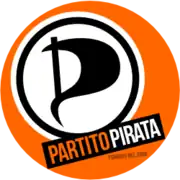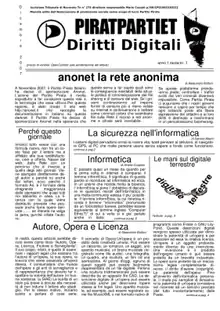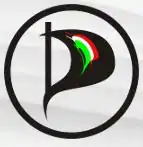Italian Pirate Party
The Italian Pirate Party (Italian: Partito Pirata Italiano, PPIT) is a political party in Italy, founded on 16 September 2006, modelled on the Pirate Party of Sweden, founded earlier that year. It supports reform of copyright and patent law, privacy and freedom of expression.[4]
Italian Pirate Party Partito Pirata Italiano | |
|---|---|
 | |
| Secretary | Maria Rosaria lo Muzio |
| Treasurer | Emmanuele Somma |
| Guarantor | Aldo A. Pazzaglia |
| Founded | 16 September 2006 |
| Newspaper | Piratpartiet Diritti Digitali[1] |
| Ideology | Pirate politics Freedom of information[2] Anti-fascism[2] Republicanism[2] |
| National affiliation | The Other Europe (2014)[3] |
| European affiliation | European Pirate Party |
| International affiliation | Pirate Parties International |
| Colours | Orange, white and black |
| Slogan | Democrazia – Trasparenza – Diritti digitali |
| Website | |
| www.partito-pirata.it | |
| Part of a series on |
| Pirate Parties |
|---|
 |
The party was a founding member of Pirate Parties International[5] and of European Pirate Party.[6]
In December 2007 the Pirate Party published its first number of the newspaper "PiratPartiet Diritti digitali" under Creative Commons license.[1]
History

In the 2009 EP elections the Party candidated its secretary, Alessandro Bottoni, as an independent in the Left and Freedom list in the Northern-Oriental Italy circoscription, gaining only 820 preferences and any seat in the EP parliament.[7][8]
In 2011 Marco Manuel Marsili founded a political party named "Pirate Party" with Jolly Roger on an orange background as symbol. It initially included the signet of the Pirate Party International. It caused a legal dispute, followed by an order from the court of Milan on 30 March 2012, which obliged the Marsili's party not to use the Pirate Party symbols in order to protect the name and the symbol of the Italian Pirate Party.[9][10] The court sentenced for a fine for every violation and condemned Manuel Marco Marsili to pay the litigation costs.[11][12]
In December 2011 the Party changed its statute and is the first organization to replace its board by a permanent virtual assembly using the LiquidFeedback platform.[13][14]
In the 2013 regional elections in Lazio the Party candidated Arturo Di Corinto as independent in Left Ecology Freedom, but he was not elected.[15] The party was also interested to run in the 2013 Trentino-Alto Adige/Südtirol elections[16] but in the end he did not participate.
In the local elections in Rome, the Party initially was intended to present its own candidate for mayor, Josef Yemane Tewelde named "Jojo",[17][18] an Eritrean-Italian boy, technically not electable because he didn't have the Italian citizenship. Then, it joined the list "Repubblica Romana" with Sandro Medici candidate for mayor,[19] collecting 720 votes (0.07%) and gaining no seat. Initially there was the intention to run with a candidate for president in the Friuli-Venezia Giulia regional elections,[20] but it finally didn't take part to those elections.[21]

At the end of the XVI Italian Republic Legislature, thanks to the success of the Pirate Party Germany, the party received some join requests from people coming from other parties:[22] Francesco Barbato[23] (ex-IdV) wanted to use LiquidFeedback in the Parliament, by recruiting two pirates in his staff,[24] but he founded his own movement "I Cittadini" (The Citizens), after his request has been rejected. Even Domenico Scilipoti (ex-People and Territory, now FI) tried to join the Pirate movement but he was not accepted,[25][26] so he decided to be elected again in Berlusconi's party The People of Freedom.
On 23 and 24 March 2013 there was the first Occasional Assembly (Assemblea Occasionale, AO), the congress of the Pirate Party, in Milan.[27]
On 25 January 2014, the second Occasional Assembly took part in Florence,[28][29] where mutek, alias Luca Cappelletti, has been elected as legal representative of the Party.
On 9 April 2014, the Party joined Tsipras' list (The Other Europe) for the European Parliament election.[3] In the 2014 local elections in Ferrara the Party wanted to join the coalition "Project for Ferrara" (Progetto per Ferrara) with former M5S member Valentino Tavolazzi's "Democracy on the move" (Democrazia in Movimento).[30][31] but the coalition won't take part to elections. The party ran for local elections in Pioltello, under the name of "Pioltello Pirata", candidating Cosimo Antonio Gervasi as mayor,[32] but the list gained 163 preferences (1.04%), not gaining any seat in the local council.[33]
In 2019, the Pirate Party ran with its list in the European Parliament election, obtaining 0.23% of the votes.
Electoral results
European Parliament
| European Parliament | |||||
| Election year | Votes | % | Seats | +/− | Leader |
|---|---|---|---|---|---|
| 2019 | 60,809 | 0.23 | 0 / 76 |
– |
Luigi Di Liberto |
References
- "Piratpartiet – Diritti digitali". Partito Pirata (in Italian). Retrieved 13 April 2014.
- "Il Codice dei Pirati". Partito Pirata (in Italian). Archived from the original on 4 February 2014. Retrieved 26 January 2014.
- "Il Partito Pirata aderisce a L'Altra Europa". Partito Pirata (in Italian). Archived from the original on 13 April 2014. Retrieved 9 April 2014.
- "Programma del Partito Pirata Italiano" (in Italian). Partito Pirata Italiano. 12 September 2006. Archived from the original on 29 March 2012. Retrieved 16 August 2012.
- "22 Pirate Parties from all over the world officially founded the Pirate Parties International". Pirate Parties International. 21 April 2010. Archived from the original on 20 June 2010. Retrieved 28 May 2010.
- "Members". European Pirates. Archived from the original on 26 May 2014. Retrieved 7 June 2014.
- "Elezioni europee ed amministrative del 6 – 7 June 2009". Ministero dell'Interno. Archived from the original on 7 March 2010. Retrieved 27 January 2010.
- Arturo di Corinto (21 September 2011). "Partito pirata sogna il boom. "Noi piccoli, servono soldi"". la Repubblica (in Italian). Retrieved 9 January 2014.
- Arturo di Corinto (3 April 2012). "Il partito pirata contro i pirati ricorre al tribunale e vince". la Repubblica (in Italian). Retrieved 9 January 2014.
- enigmax (5 April 2012). "Court Orders "Copyright Lobby-Linked" Group To Stop Pirating The Pirate Party". TorrentFreak. Retrieved 9 January 2014.
- "Ordinanza contro pirateparty.it e Marco Manuel Marsili". Partito Pirata (in Italian). 30 March 2012. Retrieved 9 January 2014.
- "Reclamo all'ordinanza contro pirateparty.it e Marco Manuel Marsili". Partito Pirata (in Italian). 28 June 2012. Retrieved 9 January 2014.
- "Statuto del Partito Pirata Italiano" (in Italian). Partito Pirata Italiano. 21 December 2011. Archived from the original on 8 December 2012. Retrieved 16 August 2012.
- "Statuto del Partito Pirata Italiano" (in Italian). Partito Pirata Italiano. 21 December 2011. Archived from the original on 8 December 2012. Retrieved 16 August 2012.
- "Un pirata della prima ora alle regionali". Partito Pirata (in Italian). 5 February 2013. Archived from the original on 10 January 2014. Retrieved 9 January 2014.
- "Die Piraten setzen Kurs auf Landtag". Partito Pirata Sud Tirolo (in German). 18 November 2012. Archived from the original on 10 January 2014. Retrieved 9 January 2014.
- "Pianeta Pirata" (PDF). Archived from the original (PDF) on 10 January 2014. Retrieved 12 April 2014.
- "Jojo che?". Roma Pirata (in Italian). 2013. Archived from the original on 10 May 2017. Retrieved 9 January 2014.
- "Risultati delle elezioni comunali del 2013 a Roma". Ministero degli Interni (in Italian). Archived from the original on 3 June 2013. Retrieved 9 January 2014.
- chr.s. (2 October 2012). "I Pirati puntano alle regionali 2013". Messaggero Veneto (in Italian). Retrieved 9 January 2014.
- "Risultati ufficiali delle elezioni regionali in Friuli-Venezia Giulia del 2013". Ministero degli Interni (in Italian). Archived from the original on 30 April 2013. Retrieved 9 January 2014.
- Stefano Bocconetti (31 October 2012). "L'Idv Barbato vuole portare Liquid Feedback in Parlamento ma i Pirati italiani non-si fidano di lui..." l'Huffington Post. Retrieved 9 January 2013.
- Luca Pautasso (20 November 2012). "Barbato, dall'Idv al Partito Pirata". L'Opinione delle libertà (in Italian). Retrieved 9 January 2014.
- "Barbato 'assume' due iscritti al Partito pirata. "Liquid feedback a Palazzo"". Il Fatto Quotidiano (in Italian). 31 October 2012. Retrieved 9 January 2014.
- Riccardo di Grigoli (21 December 2012). "I Pirati scissionisti ora dialogano con Scilipoti". la Repubblica (in Italian). Retrieved 9 January 2014.
- Angela Mauro (21 December 2012). "Domenico Scilipoti in cerca di rielezione si aggancia ai Pirati: domani congresso con alcuni di loro (ma sono quelli di destra e verranno espulsi dal Partito)". l'Huffington Post (in Italian). Archived from the original on 11 January 2014. Retrieved 9 January 2014.
- AA.VV. "Assemblea Occasionale/2013". WikiPirata (in Italian). Archived from the original on 2 February 2014. Retrieved 26 January 2014.
- "Assemblea Occasionale PP-IT | Firenze 25 January 2014". Partito Pirata (in Italian). Archived from the original on 7 January 2014. Retrieved 26 January 2014.
- "Elezioni amministrative ed europee, il Partito Pirata valuta la partecipazione e lancia il tema sulla piattaforma Liquid Feedback". gonews (in Italian). 25 January 2014. Archived from the original on 27 January 2014. Retrieved 26 January 2014.
- Marco Zavagli (1 February 2014). "Ferrara, il ritorno di Tavolazzi: "Alleato con i Pirati. M5s? Non c'è democrazia"". Il Fatto Quotidiano (in Italian). Retrieved 2 February 2014.
- m.p. (1 February 2014). "Il Ppf di Tavolazzi trova un alleato: è il Partito Pirata". La Nuova Ferrara (in Italian). Archived from the original on 4 February 2014. Retrieved 2 February 2014.
- "Una lista Pirata alle porte di Milano: #PioltelloPirata". Partito Pirata. Archived from the original on 12 May 2014. Retrieved 10 May 2014.
- "Elezioni comunali del 25 Maggio 2014: Risultati per sezione" (in Italian). Municipality of Pioltello. Archived from the original on 14 July 2014. Retrieved 7 June 2014.